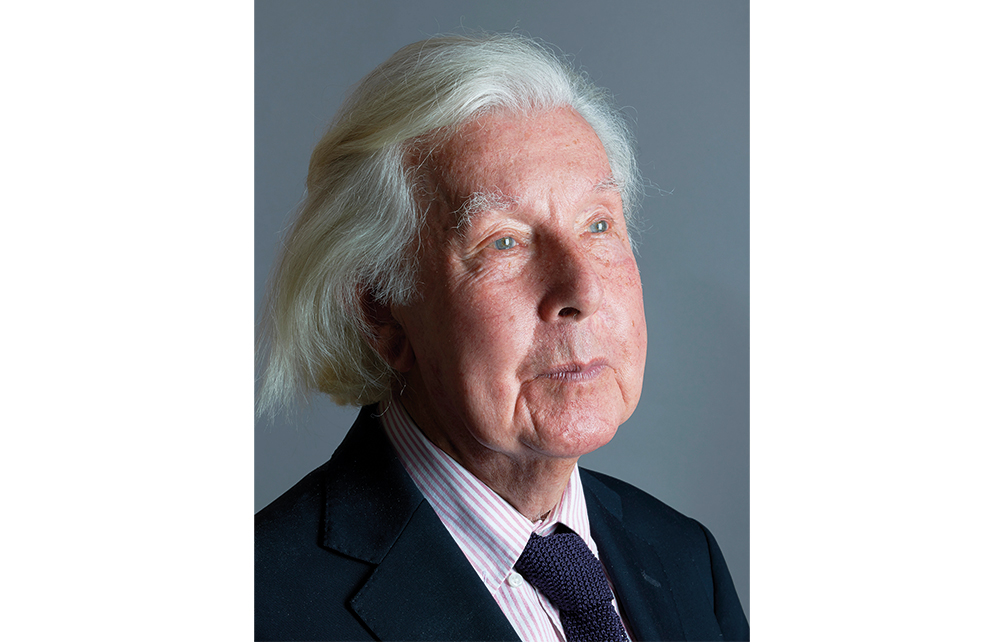In Regency Britain, balls were often timed to coincide with full moons. Provided there was no cloud cover, moonlight made it safer to send out carriages. When Ronald Blythe accepted social invitations, he also took the lunar calendar into account – because a full moon was ‘best for a merry bicyclist wheeling homeward along unlit and potholed lanes’.
This vignette captures much of Blythe’s magic. He was born in Suffolk in 1922 and his life and his writing became vessels for centuries of rural wisdom. With his death last year, that link to the distant rhythms of the English countryside was lost, but Ian Collins’s biography attempts to preserve the magic.
He sunbathed naked to the end of his life, with a straw hat handy in case of unexpected guests
Blythe’s father was a gravedigger, while his mother grew up in a London slum. His childhood was spent in rural poverty, occupying cramped labourer’s cottages little different from those described by Thomas Hardy. From his mother Blythe learnt a love of reading, nature and religion. Meanwhile, his father’s life inspired several passages in Akenfield, the polyphonic account of an imagined Suffolk village from the late Victorian era to the 1960s, which secured Blythe’s reputation as a writer.
The book sold more than 400,000 copies and became an inspiration for a new generation of nature writers. Its use of family history gave many readers the impression that they knew ‘Ronnie’ well, as did the mix of memories and anecdotes in his long-running Church Times column. But, Collins argues, there was ‘a more profound silence’ behind this seeming familiarity. Truths about his childhood poverty, his second world war service and his sexuality were only shared with close friends or else kept completely secret.
Joining the army during the war, Blythe enjoyed affairs with several soldiers. This model he would follow for the rest of his life: brief but friendly couplings that protected his emotions as well as time for writing. Asked why he never attempted a longer relationship, he replied: ‘I always knew in the end I would be the one washing the socks.’ However, as Collins points out, Blythe was 45 by the time gay sex was legalised: ‘Small wonder that Ronnie played it safe and lived alone.’ Nonetheless, he never lost his physicality, sunbathing naked to the end of his days, with a straw hat handy in case of unexpected guests.
Blythe never lived more than 50 miles from his birthplace. In the mid-20th century, this corner of East Anglia was a refuge for misfits, along with numerous writers and artists. In early life Blythe mixed with the poets and painters attracted to the Suffolk-Essex border, in particular the art schools of Great Bardfield and Dedham, which counted Lucian Freud and Maggi Hambling among their pupils. Living in Aldeburgh, Blythe worked with Benjamin Britten and E.M. Forster, and later made friends with such celebrated figures as Patricia Highsmith and Peter Hall.
The biography conjures a lost world of letter-writing and weekend visits, with country life providing the time and space to form lasting bonds. Blythe’s most important friends were John and Christine Nash, two artists on the fringes of the Bloomsbury Group who encouraged his literary career. They also left him Bottengoms Farm, a 17th-century house in the Stour Valley, where Blythe lived for the second half of his life. Here, Collins explains, ‘he aimed to write each morning, and garden each afternoon, and this ambition was pretty much enacted for the next 40 years’.
This was where Collins met Blythe in 1988, becoming a friend, Christmas companion and eventually carer. In the latter chapters of the book, the sequential narrative gives way to summary, and the detached tone grows more affectionate. When discussing drink, or the deterioration of old age, Collins’s writing becomes vague to maintain his friend’s dignity. Nonetheless, the firsthand account of Blythe’s final days is deeply moving, as nurses and friends worked round the clock so that he could die in his own bed.
What the book captures best, however, is Blythe’s abiding passion for books. Despite leaving school at the age of 14, he educated himself while working in bookshops and libraries. His love of literature was personal as much as intellectual, with long-dead writers discussed like recently departed friends. This was especially true of the ‘peasant poet’ John Clare, whom Blythe recognised as a forerunner. ‘Beneficiaries of everything they lacked,’ Collins writes, ‘John Clare and Ronald Blythe were untrained and unconstrained – with original voices purified by observation and imagination.’
Blythe’s learning was deployed with a graceful ease, especially in his weekly Church Times diary. To mark his 100th birthday, a selection from that diary was published under the title Next to Nature in 2022, with each month introduced by an admirer – the likes of Vikram Seth and Robert Macfarlane, Alexandra Harris and Olivia Laing. Less a book to read cover to cover than dip into, it blends local history and everyday observations with an enchanting range of cultural references. A trip to the optician evokes the Emperor Claudius, Gainsborough’s portraits and the Revd Patrick Brontë. The turning seasons conjure Gustav Holst composing by the hearth, George Herbert filling his rectory with flowers, and the amateur botanist George Crabbe wandering the marshland around Aldeburgh.
Collins captures the beauty of these columns, which he describes as:
Gems of observation, memory, meditation, quotation, appreciation and acceptance, illuminated by lyrical prose zooming from personal to universal in a sentence and time-travelling in a short paragraph.
They also offer a glimpse of Blythe’s enduring faith, grounded in biblical stories yet sustained by a sense of delight at creation. This is less the pleasure of hedonism than of piety, with its duty to appreciate every moment of our short span upon this earth. Blythe writes at one point: ‘I sometimes think God will ask us, “This wonderful world of mine, why didn’t you enjoy it more?”’ As this book makes clear, he never took that gift for granted.







Comments